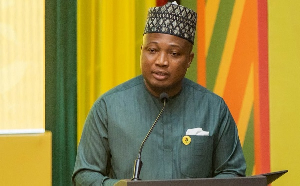The Economist Intelligence Unit writes on the Ghanaian political party scene in their latest country profile on Ghana:
In early February the president, in an announcement in the state-owned Daily Graphic newspaper, declared that he would not stand for a third presidential term in 2000, pointing out that the constitution limits the president to two terms in office. However, the speaker of parliament form the National Democratic Congress (NDC) and the ruling party's key strategist, Daniel Annan, hinted otherwise in late January. During a television interview with the Ghanaian journalist Kwaku Sakyi-Addo, Mr Annan said it was a matter of "if" rather than "when" Mr Rawlings left power. While these messages appear to be conflicting, it is possible that Mr Annan was trying to test public reaction to the idea of a third term. Alternatively, the NDC could be preparing the ground to "demand" that the president serve another term, by "popular acclaim". Either way, the possibility of a Rawlings candidature remains, but time is crucial it the government is to prepare for the necessary constitutional changes to enable him to stand again. Amending the constitution requires a national referendum and at least a two-thirds majority in parliament; the NDC currently holds 132 seats - or one seat short of two-thirds - of the 200-member chamber.
There are several reasons to suppose that the NDC would support a third presidential term. Mr Rawlings - who remains more popular than his party - is the NDC's best asset, and since the departure in December 1996 of Paul Victor Obeng, the NDC's other most popular and astute political operator, the NDC has lacked a contender with the charisma and political skills to match those of the president. In his TV interview Mr Annan appeared to rule out the likeable but inexperienced vice-president, John Atta Mills, by saying that any new candidate would have to have been with the NDC movement from the start.
The only other serious contender within the NDC appears to be the president's wife, Nana Konadu Rawlings. The first lady has several advantages over other hopefuls: she is nationally known and has a fairly wide support base thanks to the December 31st Women's Movement - a semi-political self-help group for women which she launched in the 1980s. However, she would face resistance from some senior officials and, as a woman running for president, from many ordinary Ghanaian men.
While the NDC is perceived to be more disciplined than other Ghanaian political parties, a succession struggle would sharpen factional tensions, which might damage the party's image. Several factions can be identified within the party, although as yet there is no clarity of membership or policy direction.
? Dynastic succession: Nana Rawlings, the sports minister, Enoch Teye Mensah, and the attorney-general, Obed Asamoah.
? Radicals: Regional and youth organisers and propaganda secretaries.
? Fante confederation: National security chief, Kofi Totobi Quakyi, and the president's chief of staff, Ato Dadzie.
? Northern Region: Defence minister, Mahama Iddrisu, the NDC general secretary, Hudu Yahya, and the transport minister Edward Salia.
? Asante caucus: Paul Victor Obeng (retired) and Nana Akwasi Agyeman, the mayor of Kumasi.
? Ga clique: James Annan and the interior minister, Nii Okaidja Adamafio.
? Dzelukope group: A minister without portfolio, Kofi Awoonor, and the chief of defence staff, Lieutenant-General Ben Akafia.
The main conservative opposition New Patriotic Party (NPP) postponed its national delegates' conference twice during the last quarter of 1997. The congress, originally scheduled for November 29th, was put back to December 20th and then postponed until the new year. The reason, according to the general secretary, Agyenim Boateng, was that regional branches needed more time to finish their local congresses. However, it has been suggested that the postponements also reflect divisions in the party's higher ranks and preoccupations with the selection of a party presidential candidate for the elections in 2000. There are five main contenders for the NPP leadership.
? Nana Akufo Addo, son of the former head of state, Fred Akufo Addo, has been described by the London fortnightly Africa Confidential as "the most dynamic and imaginative of the contenders".
? Agyare Koi Larbi, the MP for Akropong, is known to favour strengthening the party's weak grass-roots.
? Malik Alhassan Ykubu, the MP for Yendi and a northern leader, would help counter the NPP's image as a primarily urban, southern-based party.
? The NPP's finance spokesman, Kofi Apraku is described as too genteel to cope with the rough and tumble of presidential politics.
? John Kuffuour was the NPP's candidate in the 1992 elections, when he won 30.4% of the vote.
The preoccupation with leadership - which was also evident during 1992-96 - is likely to distract the NPP from the task of strengthening its party machine and broadening its support base beyond its stronghold in Ashanti province and the cities. Local commentators suggest that timely preparation for the district elections this year, although these are officially non-party, would help the NPP to build its support at municipal level. This would in turn strengthen its electability in the general election of 2000.
General News of Wednesday, 22 April 1998
Source: --












